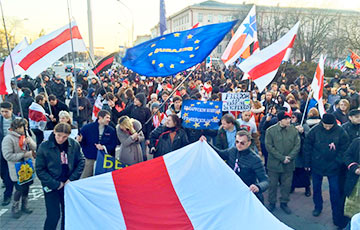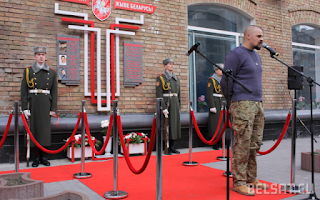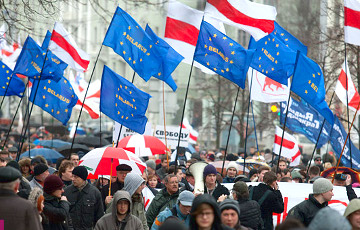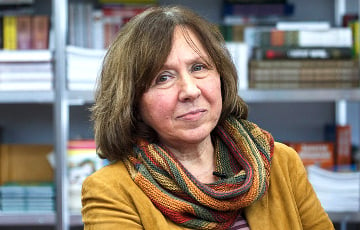
About 3,000 people took part in the march in the centre of the capital.
This year the rally on March 25 differed from the habitual format of
Freedom Day celebration for at least three reasons: far more people have
taken part in it than in recent years (about 3,000 participants); there
were very many young people and “new faces” at the rally; the
organisers and participants “broke the mould” or the plan, expected by
the authorities, several times: first when they invited people to gather
at 5 p.m. near Yanka Kupala monument, during the meeting near the
Academy of Sciences, when they decided to walk to Riga supermarket in
Surhanau Street, not to Bangalore Square, and in the end, when the young
people refused to disband despite the call of the organisers, and
continued celebration, and held a spontaneous meeting near Riga
supermarket.
The celebration was held in a festive mood, many
people were with their children and families, many songs were sung: hit
songs by Liapis and Brutto, songs of NRM and Volski.
The rally started at 5 p.m. in Yanka Kupala Park: in response to the appeal of
Mikalai Statkevich and other opposition leader more than a thousand of people came there to lay flowers to the monument of the national genius.
Other leaders of opposition, who came to the monument, were
Anatol Liabedzka,
Paval Seviarynets,
Viachaslau Siuchyk,
Uladzimir Niakliayeu, a European Belarus coordinator
Maxim Viniarski, young activists
Paval Vinahradau,
Viachaslau Kasinerau,
Paval Yukhnevich, leaders of sole traders
Ales Makaeu and
Mikalai Charnavus, a filmmaker
Volha Mikalaichyk,
parents of the Heavenly Hundred’s hero Mikhail Zhyzneuski. Many people
had brought flowers, white-red-white flags were unfurled. One of the
participants was with a Ukrainian flag, in order to support
Nadiya Savchenko.
Participants of the rally were holding posters: “Freedom Day,” “BNR
Emerged Without Authorization Of Minsk City Executive Committee,” “Your
House Is On The End Of Village [It’s No Concern Of Mine], You Say? House
At Village’s End To Burn First,” “Freedom To Nations – Death To
Empires.”
People were chanting: “Long live Belarus!,” “We Believe, We Can, We Shall Win!”, “Independence!”
Mikalai
Statkevich, Anatol Liabedzka, Paval Seviarynets, Viachaslau Siuchyk,
Uladzimir Niakliayeu addressed the people who had gathered near Kupala
monument. Stakevich offered to lay flowers and announced that there
would be a march along Independence Avenue to the Academy of Sciences,
and later people would decide themselves, whether they are going to
follow the route to Bangalore Square, offered by the authorities. A poet
and politician Niakliayeu read a poem dedicated to Yanka Kupala and
Yakub Kolas. Viachaslau Siuchyk offered to hold a moment of silence to
honour those who had laid down their lives for independence of Belarus.
Anatol Liabedzka compared the current regime with
” sewage pipe, drifting all kind of decrees and problems”.
After
the meeting and laying the flowers Statkevich urged people to form a
column and move towards October cinema near the Academy of Sciences.
On
the avenue the column occupied all the space from the circus up to the
bridge over the River Svislach. People were in a celebratory mood. They
marched along the avenue chanting “Long live Belarus!”, “Give Us Land,
Freedom!,” “Independence!”, We Believe, We Can, We Shall Win!”
Anarchists lit a flare on the bridge. The passing cars welcomed the
demonstration with honks, Minsk dwellers were waving hands from windows,
came out of cafes, some of them joined chanting “Long live Belarus!” A
huge white-red-white flag was unfurled in the head of the column.
Policemen
and traffic policemen were almost invisible, people in mufti were
filming the rally. During the march several persons in mufti tried to
hide the streamer “Your House Is On The End Of Village [It’s No Concern
Of Mine], You Say? House At Village’s End To Burn First” with their
bodies.
New people were joining the column during its movement,
and more than 2,000 people came up the Academy of Sciences. Organisers
held a short meeting near Yakub Kolas monument, people laid flowers to
the Belarusian poet.
At about 6 p.m. the column of protesters
blended into the crowd of those who had come to October cinema near the
Academy of Sciences from the start. An address of the chairperson of the
Rada of the Belarusian People’s Republic
Ivonka Survilla to the Belarusian nation was read out. It said about “seeing each other in a free Belarus before long.”
The
chairman of the Belarusian Popular Front party Aliaksei Yanukevich,
Anatol Liabedzka, the leader of sole traders Ales Makaeu addressed the
meeting. Liabedzka said that
“the source of all country’s problems is in Drazdy cottage estate” [where the president and top officials live], and demanded
“to bring Drazdy dwellers, Drazduny, to account.” The deputy chairman of the UCP
Mikalai Drazdou brought the same poster to the Academy of Sciences.
At
the meeting Makaeu announced launching of two campaigns – for
collecting 50,000 signatures of sole traders for forwarding to the
Constitutional Court a demand to reverse the Decree №222 and for
recognition of
Mikhail Zhamchuzhny and other human rights activists as political prisoners.
The
speech of Viachaslau Siuchyk was a surprise. He offered not to do the
bidding of the government and not to march to Bangalore Square, but to
march up to Riga supermarket in Surhanau Street. The name of the shop
itself symbolizes the European choice of Belarus.
The offer was
met by the audience enthusiastically, and people started to line up for
the demonstration. Activists of Art Siadziba performed Warriors Of Light
for the protesters, and it was a keynote for the procession’s mood.
As
they marched to Riga shop, young people who were the majority in the
column, sang Warriors Of Light, Hraj by Liapis Trubetskoy, Three
Tortoises by
Liavon Volski. It was a real holiday. Demonstrators
chanted: “Sasha, It’s Enough – People Need Freedom!”, “Where Are
wages?”, “Long Live Belarus!”, “Together Forever!” and “Glory To
Ukraine.”
At 7.30 p.m. the procession came near Riga supermarket.
Despite the proposal of Siuchyk to finish the rally, young people didn’t
want to disband, and continued a spontaneous celebration of Freedom
Day: they held performances, lit flares, sang Volski’s hit songs to a
guitar accompaniment. The celebratory demonstration finished much later
than the organisers and journalists had expected.
Mer bilder og video http://charter97.org/en/news/2016/3/25/196661/
 A cross with the inscriptions “Glory to Ukraine!” and “Long live Belarus!” is located in the street named after our country.
A cross with the inscriptions “Glory to Ukraine!” and “Long live Belarus!” is located in the street named after our country.














